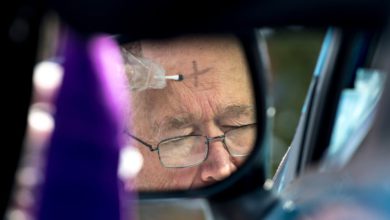LOS ANGELES — Gov. Gavin Newsom easily fended off a historic attempt to recall him from leading the nation's most populous state, an effort that threatened to shift California's role as a liberal trendsetter and would have sent shockwaves through the Democratic Party.
Newsom, a Democrat who had been heralded as a potential presidential contender, found himself at the center of the country's divisions over COVID-19 and mandates aiming to keep people safe. He was applauded for his work at the beginning of the pandemic, leading the first state to shut down. But after months of tight restrictions and public flubs, that same work helped ignite the effort that led to the fourth gubernatorial recall election in U.S. history.
Newsom needed to convince more than half of voters that he should remain in office, which he easily managed. Elections experts cautioned results could take time in the state, which is known for taking weeks to count ballots.
But less than an hour of polls closing in the state, Newsom was declared the winner by The Associated Press, NBC News and CNN.
"I'm humbled and grateful to the millions and millions of Californians that exercised their fundamental right to vote, and expressed themselves so overwhelmingly by rejecting the division," Newsom said after the race was called in his favor, noting the election sent a message to the rest of the country.
His ability to keep hold of the state in an off-year election with rules that could have allowed him to be replaced with someone garnering just 20% of the vote is likely to embolden Democrats. The first-term governor centered the race around several key issues that could be key in 2022: COVID-19 mandates, abortion, workers rights and former President Donald Trump.
Only twice in U.S. history had a governor been removed from office via recall; in North Dakota in 1921; and in California in 2003, when Gray Davis was removed and replaced by Arnold Schwarzenegger.
On the eve of the election, Newsom got a boost from President Joe Biden, with the commander in chief telling voters at a campaign rally that the "eyes of the nation are on California." Biden, who made an appearance in Long Beach, California, on Monday, warned that removing Newsom would carry consequences that would reverberate around the nation and risk returning to the "dark, destructive, divisive politics" of former President Donald Trump.
Meanwhile, Republican frontrunner and conservative radio host, Larry Elder, labeled by Biden as a "Trump clone," predicted victory.
“Make sure you have your friends vote, vote, vote, and try and get 10 more friends to vote and hit every call, make every call, knock on every door, we’re gonna win this thing if we turn out the vote,” Elder said this week.
How the California recall worked
Voters were asked two questions on their ballot: Should Newsom be recalled? If more than 50% of voters said yes, then the next question was key: Who should replace him?
Forty-six candidates appeared on the ballot. Elder has consistently been leading polls among those vying to replace Newsom.
California recall:Voter fraud claims create 'circus-like atmosphere,' stir California recall of Gov. Gavin Newsom

Other prominent Republican candidates who ran included Caitlyn Jenner, a former Olympic gold medalist who starred on the reality series "Keeping Up with the Kardashians"; former San Diego Mayor Kevin Faulconer; California Assemblyman Kevin Kiley; and John Cox, a businessman who was easily defeated by Newsom in the 2018 gubernatorial election.
The only leading Democratic candidate who had emerged in the race was Kevin Paffrath, a real estate broker and YouTube personality.
Most candidates steered clear of early Republican attempts to discredit the election with unfounded claims of voter fraud, but Elder has given the issue a wider platform.
In recent days, he suggested the results of the recall election could be skewed by unspecified “shenanigans,” echoing Trump’s baseless claims of voting fraud in his 2020 race with Biden. He refused multiple times to say he would accept the results of the race in various interviews.
There has been no confirmed evidence of widespread fraud.
The Elder campaign's website has linked to a “Stop CA Fraud” site where people can sign a petition demanding a special legislative session to investigate the “twisted results,” well before any results were announced.
Elder did not immediately acknowledge Newsom's win after multiple news outlets called the race. His campaign did not immediately respond to requests from USA TODAY.
What did voters think?
The campaign to recall Newsom largely centered on his COVID-19 policies. California became one of the epicenters of the COVID-19 outbreak last year, despite the governor employing some of the strictest mandates in the country.
Critics said he was heavy-handed, shuttering businesses and keeping children out of classrooms for longer than necessary. Newsom said his actions saved lives.
"I am angry. It should be a freedom of choice. What is this? A dictatorship?” asked Janet Webb, a 69-year-old Lafayette, California, resident who voted for Elder.
She said squabbles over Newsom’s handling of the pandemic have split her family and friends and may prompt her to move out of state.

“I can’t live here like this if they’re going to force everyone to get a vaccine,” Webb said.
Briana Mendoza, 30, said the last thing California needs is more turmoil. She voted to keep Newsom.
“We’re in the middle of a pandemic. Why would we recall the governor who has been really trying to curb the spread of the virus?” the San Diego social worker said.
Mendoza does not believe Newsom brought the recall upon himself by attending a birthday party at The French Laundry, an upscale Napa Valley restaurant, last fall in violation of his own administration’s coronavirus rules. Instead, she thinks the effort to unseat him is a backlash by a small minority of Republicans in a firmly Democratic state.
“We don’t want Elder in office,” she said. “This is ridiculous. We just got Trump out. We don’t want a Trump puppet.”
Voters' priorities split along party lines
Exit polls showed COVID-19 was the top issue for voters, followed by homelessness, the economy, wildfires and crime.
The exit poll, conducted by Edison Research for several media outlets, found about a third of voters listed COVID-19 as the top issue in determining how they voted.
But the issue split along party lines: More than four in 10 Democrats said COVID-19 was their top issue, compared to about one-fifth of Republicans. Conversely, Republican voters were more than three times as likely as Democrats to list the economy as their top issue.
Voters offered mixed reactions to the pandemic’s current trajectory in California, with about four in 10 saying the situation is improving, three in 10 saying that it remains about the same, and just under one-quarter saying that it's getting worse.
The findings largely align with recent polling regarding voters' top priorities. In a recent poll from the Public Policy Institute of California, COVID-19 again topped the list of issues important to the state’s voters.
Contributing: Tom Coulter, The Desert Sun; The Associated Press
Source link








